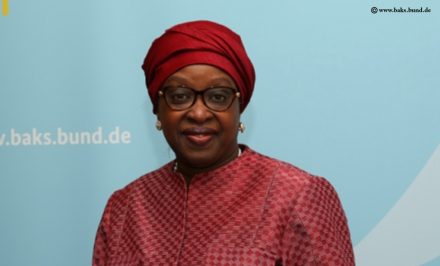 Cameroon : Dr. Yasmine Ndassa, the research scientist turned data storyteller
Cameroon : Dr. Yasmine Ndassa, the research scientist turned data storyteller
 Julien Ngum Che : advocating for the rights of displaced women and youth in Cameroon
Julien Ngum Che : advocating for the rights of displaced women and youth in Cameroon
 Chilufya Mutale Mwila, the Zambian entrepreneur driving financial inclusion across Africa
Chilufya Mutale Mwila, the Zambian entrepreneur driving financial inclusion across Africa
 Wangari Muchiri, the Kenyan engineer committed to accelerating the ecological transition in Africa
Wangari Muchiri, the Kenyan engineer committed to accelerating the ecological transition in Africa


Bineta Diop is a fervent Senegalese women’s rights activist. As the African Union’s special envoy for women, peace and security, she is also involved in peace negotiations in several African countries.
Bineta Diop has committed to promoting women’s rights for almost forty years. She has contributed to the drafting of the founding legal texts for the promotion of women’s rights in Africa.
She was deeply influenced by her mother, Marème Lô, who was vice-president for women of the « Senegalese Progressive Union » party. At 19, she was married to a diplomat. She moved to Ethiopia where she completed her A-levels. There, she had the opportunity to meet the pioneers of the Organization of African Unity (OAU), before flying to France where she studied commerce.
In 1981, she moved to Geneva in Switzerland where she joined the International Commission of Jurists (ICJ) as project coordinator. She was the first African to join this Human rights NGO. But in 1996, she left the NGO, because in the organization, “we only talked about men, but never women”, she said. Along with other African women leaders, she founded the same year « Femmes Africa Solidarité » NGO in Geneva. The organization’s mission was part of the implementation of UN Resolution 1325 on women’s rights, peace and security which aims to prevent, resolve conflicts in Africa and empower women to lead peacebuilding.
She contributed to the drafting of the African Charter on Human and Peoples’ rights in the early 80’s and noticed the suffering of women in Africa, Asia and the Middle East. Therefore, she decided to gather eminent African women lawyers who drafted the Maputo Protocol in 2003 which guarantees women’s rights at the political, social, health…levels. It has become one of the core texts in promoting women’s rights.
Promoting peace in Africa
After contributing in 2000 to the adoption of Resolution 1325 aiming to involve women in peacekeeping processes, she took part in several peace negotiations and talks in Africa. In Burundi and the Democratic Republic of Congo, she facilitated the dialogue for peace and also led a post-conflict electoral observer mission. In the early 2000s, she enabled a Regional Peace Summit between Liberia, Sierra Leone and Guinea. Likewise, in South Sudan, she was involved in a commission of inquiry on violence against women. In Somalia, where a large contingent of women involved in peacekeeping operations is deployed by the African Union, she decided to allow women soldiers to call their children while keeping the peace.
Since 2014, she has been the AU Special Envoy for Women, Peace and Security. In 2011, she was ranked among the 100 most influential people of the Times magazine.